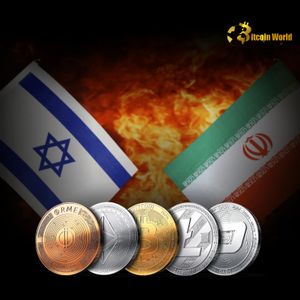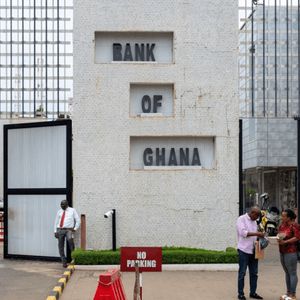Urgent: Iran-Israel Conflict Threatens Cryptocurrency Market Stability
5 min read
BitcoinWorld Urgent: Iran-Israel Conflict Threatens Cryptocurrency Market Stability The geopolitical landscape is shifting, and a recent report citing an Iranian security source via Reuters suggests a potentially significant escalation. According to Jin10.com, Iran is reportedly preparing a ‘harsh response’ to a recent Israeli strike. While this news focuses on international relations, events of this magnitude rarely stay confined to political arenas; they often send ripples through global financial markets, including the dynamic world of cryptocurrencies. For crypto investors, understanding the potential cryptocurrency market impact of rising tensions is crucial. Understanding the Iran Israel Conflict and Its Roots The report points to heightened tensions following an Israeli strike. The Iran Israel conflict is a long-standing, complex rivalry involving regional power struggles, proxy conflicts, and ideological differences. Recent events, such as the alleged Israeli strike Iran is referencing, have brought these simmering tensions to a boiling point. An Iranian security source’s statement about a ‘harsh response’ signals a potential escalation that market participants, including those in the crypto space, must monitor closely. How Geopolitical Risk Impacts Financial Markets Historically, significant geopolitical events introduce uncertainty and often lead to increased volatility across traditional financial markets – stocks, bonds, commodities, and currencies. Investors tend to react to the perceived risk, sometimes moving capital to assets considered ‘safer’ or simply reducing exposure to volatile assets. This pattern of reaction can spill over into the cryptocurrency market, even though crypto operates outside traditional financial systems. Increased Uncertainty: Conflict creates unpredictable outcomes, making investors hesitant. Risk-Off Sentiment: During times of high tension, investors may sell ‘riskier’ assets. Commodity Price Spikes: Tensions in the Middle East can significantly impact oil prices, affecting global economic stability. Currency Fluctuations: Geopolitical events can cause shifts in major currency values. Will the Iran Israel Conflict Drive Bitcoin Price Volatility? One of the primary concerns for crypto holders is the potential for Bitcoin price volatility . Bitcoin, being the largest cryptocurrency by market cap, often acts as a barometer for the broader market. When major global events occur, Bitcoin’s price can react sharply. There are differing views on how geopolitical risk affects Bitcoin: Some argue Bitcoin acts as a ‘digital gold’ or a safe haven asset, uncorrelated with traditional markets. In theory, during times of conflict or economic instability, investors might flock to Bitcoin as an alternative store of value, potentially driving its price up. This narrative gained some traction during previous periods of global uncertainty. Others contend that Bitcoin still largely behaves as a risk asset, similar to tech stocks. Under this view, increased geopolitical tension and a general ‘risk-off’ sentiment in traditional markets would likely lead to a sell-off in Bitcoin and other cryptocurrencies as investors prioritize liquidity or less volatile assets. Recent market history shows instances supporting both arguments, making the outcome uncertain. Navigating Geopolitical Risk Crypto Exposure For those invested in the digital asset space, understanding and managing geopolitical risk crypto exposure is vital. The potential for a ‘harsh response’ from Iran introduces a significant layer of uncertainty. While no one can predict market movements with certainty, here are some points to consider: Stay Informed: Monitor not only crypto news but also major international news sources covering the situation between Iran and Israel. Assess Your Portfolio: Understand your risk tolerance. Are you comfortable with potential sharp price swings? Avoid Emotional Decisions: Panic selling or buying based purely on headlines can be detrimental. Stick to your long-term investment strategy. Consider Diversification: While diversification doesn’t guarantee profits or protect against all losses, having a varied portfolio (within crypto or across asset classes) can potentially mitigate risk. Focus on Fundamentals: While macro events cause short-term fluctuations, the long-term value of crypto assets is driven by their underlying technology, adoption, and development. What Do Middle East Tensions Mean for the Crypto Market? Rising Middle East tensions crypto investors should be aware of can manifest in several ways. Beyond direct price volatility, prolonged instability in a key global region can have broader economic consequences that indirectly affect crypto: For example, significant disruptions to oil supply lines could lead to energy price surges. This impacts global inflation, central bank policies (like interest rate decisions), and overall economic growth. Such macro factors inevitably influence investor sentiment and capital flows, which in turn affect the crypto market. Furthermore, increased global instability might prompt governments to tighten regulations on capital flows, potentially impacting crypto exchanges and transactions. While the immediate focus is on the potential for a direct market reaction to the ‘harsh response’ news, the cascading effects of sustained Middle East tensions on the global economy are a critical long-term consideration for anyone holding digital assets. Actionable Insights for Crypto Holders Given the potential for increased Bitcoin price volatility and overall market uncertainty stemming from the Iran Israel conflict , what concrete steps can crypto holders take? Set Price Alerts: Use exchange or tracking tools to set alerts for significant price movements in your key holdings. Review Stop-Loss Orders: If you actively trade, consider setting or adjusting stop-loss orders to limit potential downside in case of a sudden market downturn. Reduce Leverage: If you trade with leverage, consider reducing your positions to minimize liquidation risk during periods of high volatility. Stay Liquid (Partially): Having some stablecoins or fiat currency readily available can allow you to potentially buy dips if the market corrects, or simply provide peace of mind. Conduct Thorough Research: Understand the specific risks associated with the assets you hold, beyond just market-wide volatility. The report of Iran preparing a ‘harsh response’ is a stark reminder that external geopolitical forces can significantly influence the seemingly separate world of cryptocurrency. While the direct impact of the Iran Israel conflict on the cryptocurrency market impact is subject to debate and dependent on the nature of any escalation, the potential for increased Bitcoin price volatility and broader geopolitical risk crypto exposure is undeniable. Investors should remain vigilant, stay informed about Middle East tensions crypto market reactions, and employ sound risk management strategies during these uncertain times. The coming days could be crucial in determining the market’s reaction to this developing situation. To learn more about the latest cryptocurrency market impact trends, explore our article on key developments shaping Bitcoin price volatility institutional adoption. This post Urgent: Iran-Israel Conflict Threatens Cryptocurrency Market Stability first appeared on BitcoinWorld and is written by Editorial Team

Source: Bitcoin World



